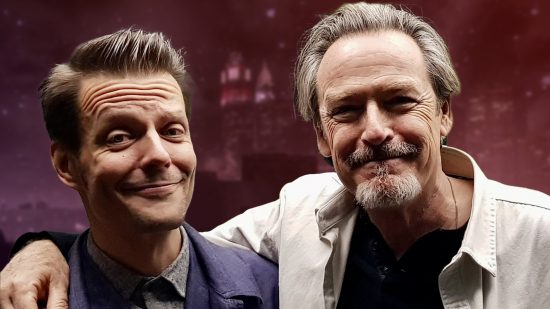We’ve all got those games that are life-affirming. Experiences that make the walls of the gaming medium fall away, captivating us completely in a world we never want to leave. Max Payne is one of those games for me, a hard-boiled, smokey cacophony of shotgun shells and slow motion. Remedy Entertainment laid down its now signature blend of surrealistic action and pitch-perfect writing, but one element truly made Max Payne ascend to another realm: James McCaffrey.
“They were all dead. The final gunshot was an exclamation mark to everything that had led to this point.” This is the first line spoken by James McCaffrey in his debut turn as Max Payne. Easily one amid the most stunning openings to a game out there, McCaffrey’s vocals cut through the New York City fog, his now iconic gravelly tones introducing me to a bleak ordeal. I wasn’t exactly old enough to play the first Max Payne entry, as a roughly seven-year-old me blasted away mobsters and drug dealers in the RagnaRock club.
However, I can’t thank my brother enough for letting me sneakily play the game, and introducing me to one of the best games the PS2 offers. As soon as those distinct McCaffrey tones emitted from our then-futuristic 14″ CRT TV, I knew that this was something different. McCaffrey was our narrator, our shepherd through the snow-laden rooftops of New York City. He could have played Payne far more heightened, but Payne became an anti-hero unlike any other.

He could have leaned into the machismo of 90s action heroes, as the game’s release came at the tail end of that era. Instead, McCaffrey’s delivery is restrained yet calculated. There’s a reluctance to Payne’s participation in the story, as he drags his blood-stained leather jacket off the beaten path of apartment block shootouts and drug-induced nightmare landscapes. McCaffrey describes it all with a miserable drawl, sinking deeper into a sea of metaphors that’d make noir legends like Raymond Chandler smile. Could you imagine how fucking good McCaffrey would have been in something like L.A. Noire?
Max Payne’s unique graphic novel presentation wasn’t just born out of creative expression, but out of necessity. Remedy’s resources were considerably limited, and the studio relied on its staff to fill in the roles of Max Payne’s cast. Creative director Sam Lake made it a family affair, getting his mother to portray villain Nicola Horne on-screen. This style of storytelling gave McCaffrey everything he needed to make Max his own, as there wasn’t any motion capture or elaborate cutscenes to adhere to.
This was at a time when the possibilities of 3D storytelling were beginning to take on loftier challenges, long before studios like Naughty Dog, Insomniac Games or Max Payne publisher Rockstar Games would take its talents to some of the best PS5 games around. McCaffrey’s talents stood out, bringing an award-worthy performance to Max Payne’s modest development restrictions. I’ve always been ensnared by how Remedy Entertainment plays with the lines of the medium, opting to strip away any trappings that point toward the notion of ‘hey, this is a videogame’.

Recent Remedy games like Alan Wake 2 or Control owe so much to Max Payne, not just in visual aesthetic, but to McCaffrey’s blueprint for building rich characters through vocal delivery alone. Of course, McCaffrey has had Sam Lake’s words and excellent direction from Markus Mäki and Petri Järvilehto on the first two entries. Max Payne 3, developed solely by Rockstar Games (with Lake’s blessing), adds a new flavor to McCaffrey’s dialogue. That time it was soaked with bourbon and the sweat of Brazillian heat.
No matter what direction the character was taking, I’ve always felt like I was seamlessly connected to Payne’s journey, hanging on every depressed syllable along the way. But there was time for humor, even if the words on the page didn’t always dictate it. McCaffrey always brought out a hidden layer in his work, sprinkling dashes of dark comedy readings that other voice actors may have overlooked. It is a testament to McCaffrey’s timing and the passion that he radiated within the role. It is so intertwined that it still warps my mind to imagine that Lake and McCaffrey are separate entities, even when I met Lake earlier this year.
Payne/Lake/McCaffrey are one in the same and they always will be to me. It says a lot about the relationship McCaffrey had with Remedy too, as he only appeared in two other projects that weren’t within the Remedy/Rockstar remit. His presence is woven within the fabric of all things Remedy, whether he is playing Zachariah Trench in Control or the dizzyingly ultra-meta character Alex Casey in Alan Wake. That meta madness was brought to a head in Alan Wake 2 when Lake lent his likeness to the character, and McCaffrey’s voice echoed throughout the alleyways of The Dark Place. While it is bittersweet to have Alan Wake 2 as his final role, it is beautiful to see his voice paired with Lake’s visage once more, in a full circle moment.

All of these hours I’ve spent with McCaffrey’s work are priceless to me. I’m forever grateful for Max Payne especially, as McCaffrey and co. broadened my horizons to what games could be. It is more than just pressing buttons on a plastic controller, waiting for bullets to pass me by in slow motion. There’s something poetic about the final scene of Max Payne 3, as Payne finally walks off with a sunset ending. I’m going to miss McCaffrey’s immense talent in future projects, but any voice actor should be so lucky to have a legacy this incredible to look back on.
